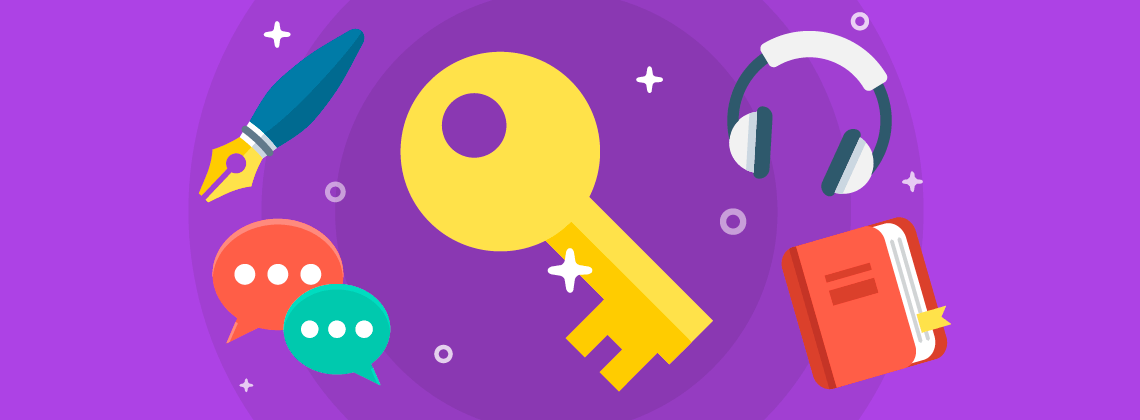

Many people often say that learning and maintaining a new language is a lot like developing a muscle that you haven’t used before. On one hand, continuous practice can help you strengthen previously dormant abilities and discover skills that you never knew you had. On the other, failure to train can quickly lead to the disappearance of the tools that you worked so hard to foster in the first place.
The one thing that’s sometimes overlooked in this comparison is that a language isn’t one big muscle. Think for a moment about the tools you use and the things you do every time you speak your mother tongue. Of course you use your mouth to form words, which become phrases, sentences and ultimately paragraphs, but in most cases, these statements come in response to something that was said to you. And in order to be able to respond to what is said to you, it’s critical to have strong listening skills.
As another example, think about when you’re not in the presence of another person, but still seek to converse–maybe through text messaging or some form of internet chatting. It goes without saying that listening and speaking skills won’t do you much good here–they can’t hear you and you can’t hear them. Instead, you’ll find that in these instances, you’re much more likely to lean on reading and writing skills than the other two aforementioned abilities.
The point in all of this is that when we strive to learn a new language, we don’t just employ one skill set or “muscle group,” we use four. With that in mind, how can we train ourselves in a way that adequately develops all of these abilities equally?
Open your ears

One of the building block skills to learning any language is listening ability. This skill is a lot like studying for a test in that you want to prepare yourself as well as possible for a variety of nuances that you might encounter. This might include different accents, dialects, idioms, and even word choice that may all fall under the same umbrella of the given language you hope to learn. In preparing yourself to encounter these different components, a lot of training tools can prove very helpful.
For starters, you might look into different genres of music, movies, and TV shows. Each of these are sure to make use of different conversational pace, subject matter, and word choice, which will guarantee balanced exposure to different ways of speaking. From here, news broadcasts and speeches may also be of tremendous help, as they present the language you seek to learn in a more formal format.
Read and expand

As you fine-tune your listening skills, you’ll also want to make sure you are giving ample attention to your reading ability. It is here that you will establish a strong foundational well from which to draw vocabulary that you can use in conversation, either in writing or speaking.
News articles and blogs that cover subjects of interest to you can be a great place to start, as they not only expose you to words with which you may not be familiar, but also give you the appropriate contexts in which to use the words. This way, when you reach into your vault of newly-acquired vocabulary, you’ll be sure to apply the proper use to the word you hope to employ–avoiding any potential usage confusion in the process.
Write away

Once you’ve got a solid vocabulary foundation, it’s time to put it to use through writing practice. As was mentioned before, texting with friends and letters to loved ones is a great, informal place to start when looking to develop this skill. From there, you can get more formal and practice formal letters to a company you may wish to work for, or maybe even translate an essay you wrote in the past that you were particularly fond of.
All of this practice will enable you to properly employ different vocabulary you’ve learned in other exercises, while also strengthening your command of grammar in the language you seek to learn.
Talk: putting it all together!

With listening, reading, and writing skills now adequately developed, you can put everything you’ve learned together through rigorous speaking practice. The words that you’ve learned through reading, grammar you’ve acquired through writing, and conversational flow and word pronunciation you’ve gained from listening all blend together here to form the skill, which is arguably most-used of all.
Speaking practice can be particularly fun and helpful if you have a friend or family member whose native language is the one you hope to pick up. In speaking with this person, you can try out all of the new skills you’ve learned in an atmosphere that is both non-judgmental and encouraging.
As we noted at the beginning, language learning is not something that happens in a vacuum. If you practice to be a great speaker, but neglect your writing, reading, and listening skills, you’ll have trouble making great strides in learning the language. In the same way, being a great writer that can’t understand what others are saying can be severely limiting within the scope of overall language success.
As the famed linguist Noam Chomsky once noted, “Language etches the grooves through which your thoughts must flow.”
Allocate ample time to all relevant language skills, and your grooves will carry you to fluency in no time!
This post was written by Lúcia Leite. Lúcia is part of the www.lingholic.com team. She has a degree in English and German languages. At the moment she is taking a Master degree in ESL for young learners and is passionate about teaching languages. Follow @lingholic on Twitter for more languages chatter!

